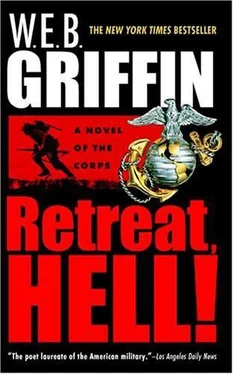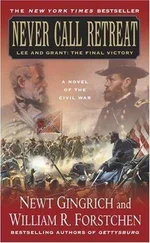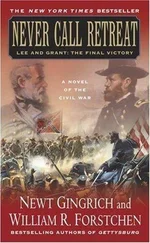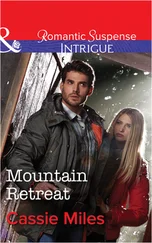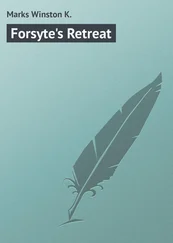What if the patrol gets in trouble and asks for help?
. . . but when Allen asked those questions of Major Masters, the answers had been something less than completely helpful.
Major Masters said he couldn't get into that, "for security reasons." All Allen had the need to know was that if the patrol showed up, he was to notify him by the most expeditious means. He clarified that somewhat by saying Allen should transmit the code words "Trojan Horse," on receipt of which further orders would be issued.
Major Masters had then gotten back in his jeep and driven off.
There were three possible communications links between the Charley Company roadblock and Division Headquarters, none of them direct. There was a radio in Allen's sandbagged command post—the CP—which sometimes could communicate with Battalion and/or Regiment. The Signal Corps equipment available was about as old and unreliable as everything else. Each of the tanks had radios that in theory permitted them to communicate with one another and with the CPs of the Regimental Tank Company and Regiment. Only two of the three tanks were on that "net," and communications with Tank Company and Regiment were the opposite of reliable.
Finally, there was a field telephone system, called a "landline," which connected the roadblock CP with the 1st Battalion Command Post by wire. That usually worked during the day, but only after the Signal Corps wire men had laid fresh wire to replace the wire Korean farmers had stolen during the previous hours of darkness.
With these problems in mind, Captain Allen had ordered that one of his three jeeps and a driver always be parked next to the CP, so that if either the enemy or the mysterious patrol showed up, and neither the radios nor the land-line was functioning, he could shag ass—Paul Revere-like—down the road to Battalion, crying, "The gooks are coming! The gooks are coming!"
When word of a jeep flying an American flag on its antenna had appeared at the crest of a hill five hundred yards south of his roadblock, it came from George Patton, as Second Lieutenant George Parsons, USMA '49, of Regimental Tank Company had inevitably been dubbed. Captain Allen and Foster Four were in the CP discussing over a mug of coffee whether it would be safe or not to conduct yet another midnight requisition on the regimental ration dump.
The SOP was that one officer (First Sergeant Grass was included) would always be on the line in case something happened. When Allen and Foster Four got to the line, they saw George Patton in the turret of one of the Shermans and Grass in the left .50-caliber machine-gun emplacement, both studying the hill and the jeep through binoculars.
The jeep with the outsized flag hanging from its antenna was an odd sight, and Captain Allen was pleased that his order "No one fires at anything until the word is passed" had been obeyed. He hadn't been at all sure that it would be. When soldiers—even experienced soldiers, and his men were anything but that—are told there is nothing in front of them but the enemy, the natural inclination is to shoot at anything that comes into sight before it has a chance to shoot first.
The driver of the jeep was standing beside the vehicle, waving his arms over his head.
"First Sergeant, you want to take a chance and go out there and wave back?"
First Sergeant Grass handed his binoculars to Allen and walked in front of the sandbags. Allen then steadied himself on the sandbags and put the binoculars to his eyes.
The driver, leaving the jeep on the hill, walked back over the crest and disappeared.
A minute or so later, another soldier appeared . . . That's not the same guy. . . waving his arms over his head, got in the jeep, and started easing it down the hill.
Sometimes you can't see diddly-shit through binoculars, and sometimes there is extraordinary clarity and detail. This time—even though it was rapidly getting dark—it luckily was the latter. Allen could even read the front bumper markings on the jeep: HH7DIV on the right, 36 on the left. The jeep was Vehicle #36 of those assigned to Headquarters and Headquarters Company, 7th Infantry Division.
The somewhat less than deep and confidence-inspiring voice of George Patton called from the turret of the Sherman to his right.
"Vehicle on the road, Captain!"
"I wonder who the hell that is?" Allen asked aloud, and then called back, "Americans?"
"An officer and somebody else in a jeep," the voice called back.
Allen pushed himself off the sandbags and climbed up on the tank to see for himself.
In a moment, he was able to identify the officer in the jeep. It was the assistant Division G-2, Major Masters.
Well, he probably had word that this mysterious patrol of his was coming in.
Allen climbed off the tank, and a minute or so later the jeep slid to a halt beside the tank and Major Masters jumped out.
Allen saluted. Masters returned it crisply.
"You were told to be on the alert for a patrol. . . ."
"Yes, sir," Allen said. "I think that's what's coming in now."
He pointed down the road.
"Did I or did I not, Captain, tell you to notify me by the most expeditious means when that happened?"
"Yes, sir, you did," Allen said. "This just happened, sir. Just a couple of minutes ago. I don't know if it's your patrol or not."
Major Masters peered carefully around the skirts over the tank's tracks.
"That's one man in a jeep," he declared, "not a patrol."
"The jeep came over the hill a couple of minutes ago, sir. The driver waved, we waved back, and now somebody else is driving the jeep."
Major Masters either grunted or snorted.
There was the sound of a carbine firing. One round.
The jeep skidded to a stop, and the driver got out and held both arms over his head.
"I think that was an accidental discharge, sir," Captain Allen said.
And if Sergeant Grass saw who fired it, he'll kick his ass all the way back to Japan.
"Unfortunate," Major Masters said.
"Only a few of my men have ever been in a situation like this, sir."
"Tell me about it," Major Masters said, then added: "Well, he's coming in. Let's see what he has to say."
They walked to the .50-caliber air-cooled Browning position on the left, arranged themselves behind its sandbags, and watched as the tall soldier, his arms still over his head, walked toward them.
The soldier was no boy, but there were no chevrons visible on the sleeves of his fatigue shirt.
When he was twenty yards away, Captain Allen stood up.
"Over here, soldier," he called.
The soldier trotted to the machine-gun emplacement, dropped his arms, and saluted.
"Who are you?" Major Masters demanded.
"Technical Sergeant Jennings, sir."
"Are you in charge of this . . . patrol?"
"No, sir. Sir, with respect, may I go wave the others in?"
"Go ahead, Sergeant," Allen said.
Masters gave him a dirty look, and when Jennings was just possibly out of hearing range, said, "I was talking to that man, Allen. You should not have interfered."
"Sorry, sir."
Fuck you! Until someone relieves me, I'm in command here, and you're just a goddamn visiting brass hat. A minor-league brass hat.
Jennings trotted halfway toward where he had stopped the jeep and gestured toward the hill that it was all right to come in. Then he trotted back to the machine-gun emplacement.
"Just who is in charge of your patrol, Sergeant?" Major Masters asked.
"Sir, with respect, if I don't find a slit trench in the next sixty seconds, I am going to have a personal catastrophe."
"Over there, Sergeant," Captain Allen said, chuckling as he pointed.
"Thank you, sir."
Masters gave him another dirty look.
Читать дальше
